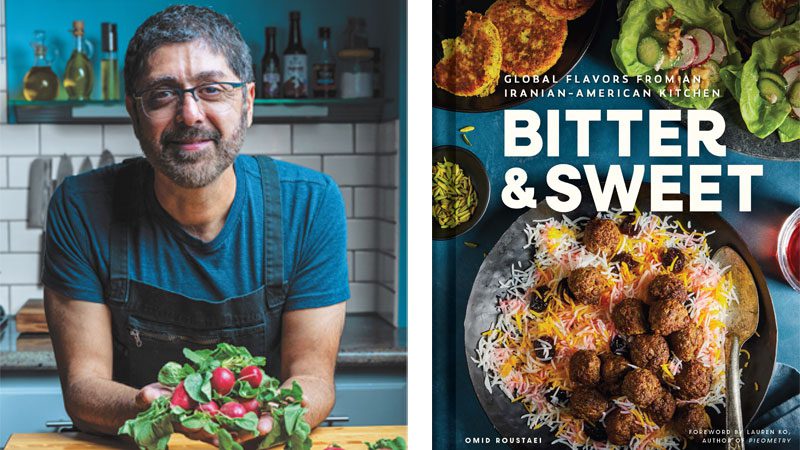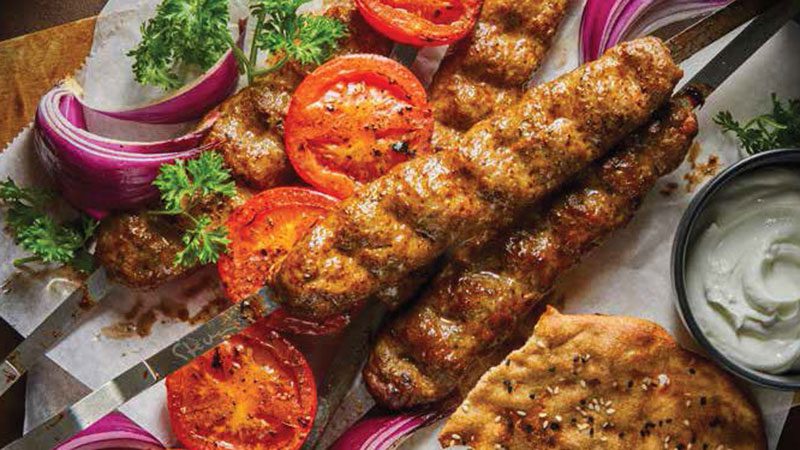A “Bitter & Sweet” journey with The Caspian Chef
by Rebekah Denn

photos © Weldon Owen International
Omid Roustaei knows that food sometimes comes with love letters attached.
When teaching cooking classes at PCC around 20 years ago, he showed staff members how to make Aash-e Jow, an aromatic barley soup with beans and herbs.
Years later, PCC’s receptionist at the time, Amelia Rampe, had become a culinary school graduate and food writer. Rampe, a former senior editor for Food & Wine, described Roustaei’s “Life-Changing Persian Soup” in a national article as a major turning point for a young cook, with the simple lunch igniting her “culinary curiosity.”
The encounter is just one brief mention in an array of life-changing moments in Roustaei’s new cookbook, “Bitter & Sweet,” focused on Iranian-American flavors and recipes. PCC members and shoppers might already know Roustaei from the many years he taught co-op cooking classes, or from his blog and Instagram page, “The Caspian Chef.”
About Seattle chef Omid Roustaei
“Chef” is one of Roustaei’s many paths, but nourishment extends through every corner of his life. In the book, he describes a childhood backed by “the aromas of vibrant herbs and intoxicating spices, and the sounds of sauteing onions and simmering stews.” Summers were spent flying kites, building sandcastles, and swimming in the Caspian Sea.
The Iranian Revolution of 1979 brought conflicts, food shortages, and later a war with Iraq. Roustaei eventually left Iran for school in the United States, a microbiology degree and a career in biotech — and then an unexpected detour into cooking school.
Working in Seattle in 1998, he took a PCC cooking class with a good friend who had decided to become vegan. It sparked a new focus that led him to The School of Natural Cookery in Boulder, then a “full circle” return to Seattle, becoming a personal chef and teaching cooking at PCC — including that same “Foodworks” class that had inspired him.
Nourishment took a different path when he opened up to a therapist about his youthful experiences during the revolution and its aftermath. The value of therapy led him to pursue a graduate program in psychotherapy and then his own therapy practice, sharing the same opportunities for growth and understanding that he had received. He calls therapy a perfect complement to his culinary work, including teaching courses on the psychology of nourishment at Bastyr University.
By 2012 he was fully established as a therapist, and “after all the years of doing a little bit this, a little bit of that,” decided to focus on his practice.

Returning to roots
Roustaei thought he was done with teaching cooking — until the 2016 election and its “change in the landscape.”
As an immigrant, especially one from a country many in the U.S. saw as unknown and mysterious — and frightening — he took up teaching again. This time, it focused on Persian cuisine, sharing his roots and warm culture.
“Class after class after class, I started talking about the food, but part of I think what I learned was stories really elevate the food, and relating to the people who cook the food and the traditions around preparing the food … and so I started telling tales,” he said.
“I would talk about Iran, my history, why I’m teaching, what my mission was.”
The blog and eventually the book became an added resource for that — an emotional one.
“I literally sat here with a tissue box” while writing the book, he said. He had set aside so many memories of exile and displacement, “either intentionally or subconsciously” assimilating into another culture. Writing reminded him of all he had buried for so long before reclaiming his Iranian identity and becoming something of an ambassador for his first home.
So much of food, for many of those who forced to leave Iran, is about nostalgia and love and loss. Dishes might be “authentic” to how they were served in childhood, but cooks seldom know how they have evolved over time, along with the place of those memories.
“To feel the joy — and I feel a lot of it — I also had to face a lot of the feelings of not knowing if I could ever return back to Iran, not knowing if the politics of Iran could ever change, and carrying this burden,” Roustaei said. “There’s such trauma layered into this Iranian diaspora as a result of what happened and what sadly continues to happen.”
Even if he is not directly affected day-to-day, he said, “I can certainly put it in the context of, will I ever be able to swim in the Caspian Sea? Will I ever be able to see where I grew up?”
Through food, at least, he can share some of the beauty and love, the flavors and inspiration, the life-changing moments, with us all.
More about The Caspian Chef
The cookbook “Bitter & Sweet” is available at all PCC stores.
Roustaei’s cooking classes and events calendar is online here.
Want to try some of Roustaei’s recipes from past PCC classes? They include Khoresh-e-Ghormeh Sabzi (Fresh Herb Stew), Khoresh-e-Fesenjoon (Chicken Simmered in a Rich, Tangy and Sweet Pomegranate Walnut Sauce), and Salad Shirazi (Persian Tomato and Cucumber Salad).
